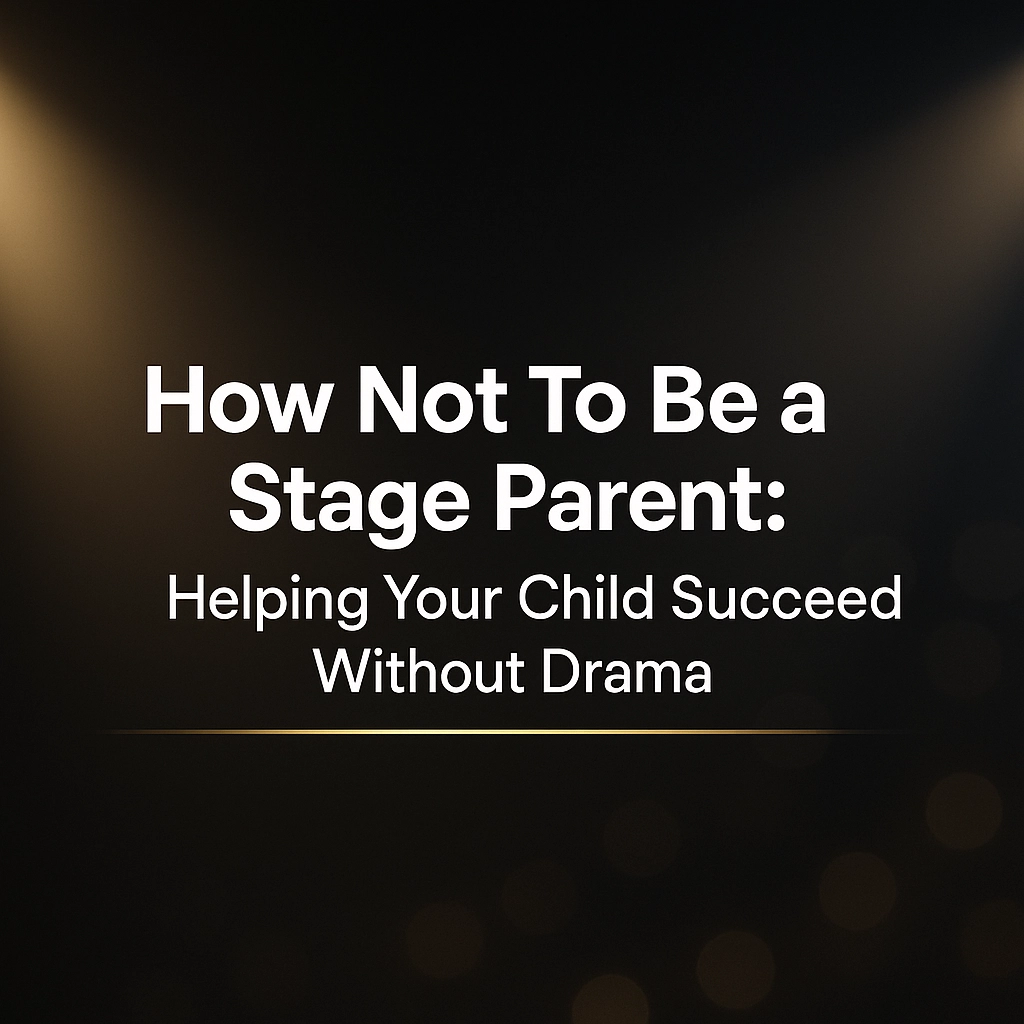We've all seen them—the parents who hover, demand, and create drama at every audition. The ones who argue with casting directors, coach their kids from the sidelines, and treat every "no" like a personal attack. Unfortunately, these stage parents often do more harm than good, sometimes sabotaging their child's career before it even begins.
Here's the thing: your child needs your support to succeed in entertainment, but there's a huge difference between being supportive and being a nightmare. Let's talk about how to be the parent every agent, coach, and casting director wants to work with—while actually helping your kid thrive.
The Fine Line Between Support and Sabotage
Supportive Parent: Drives their child to auditions, helps them prepare, and celebrates both successes and learning experiences.
Sabotaging Parent: Argues with everyone, blames coaches when their child doesn't book, and creates drama in waiting rooms.
The difference? One builds relationships and opportunities; the other burns bridges faster than you can say "callback."
At NYLA Talent, we've seen both types. The kids with supportive parents tend to book more, handle rejection better, and develop genuine confidence. The kids with dramatic parents often struggle with anxiety, pressure, and damaged professional relationships before they're even teens.
Red Flag Behaviors That Kill Opportunities
Let's be honest about the behaviors that make industry professionals cringe:
The Helicopter Hover: Standing behind your child during virtual auditions, feeding them lines, or constantly adjusting their appearance. Casting directors want to see your kid's natural ability, not your coaching skills.
The Excuse Maker: Blaming the lighting, the camera quality, their outfit, or anything else when your child doesn't book. This teaches kids to avoid responsibility and makes you look unprofessional.
The Pushy Negotiator: Trying to negotiate with casting directors or coaches about roles, feedback, or opportunities that aren't yours to negotiate. This is a business, and there are proper channels for everything.

The Social Media Critic: Posting negative reviews or complaints about directors, team members, coaches, casting directors, or other families online. The entertainment industry is smaller than you think, and this stuff gets around.
The Comparison Parent: Constantly comparing your child to others, asking why another kid got the role, or making disparaging comments about other young performers. This creates toxic competition and anxiety.
Building Relationships That Open Doors
Industry professionals—agents, coaches, casting directors—are more likely to recommend and remember kids whose parents are easy to work with. Here's how to build those crucial relationships:
Communication is Key: When you need to discuss something with your child's coach or agent, do it privately and professionally. Don't ambush them in front of other families or during class time.
Trust the Process: Remember that coaches and agents want your child to succeed too Ask questions, but avoid micromanaging every decision.
Show Gratitude: A simple "thank you" goes a long way. When your team or coach gives feedback, when your agent submits your child for something, or when you receive guidance, acknowledge it.
Be Punctual and Prepared: Show up on time, with everything your child needs. This sounds basic, but you'd be surprised how many parents create chaos by being consistently late or unprepared.
The Power of Positive Example
Kids learn more from what they see than what they hear. When you handle disappointment gracefully, celebrate others' successes, and maintain professionalism, you're teaching invaluable life skills.
Positive Example: Your child didn't get the commercial they really wanted. You acknowledge their disappointment, remind them of how well they did, and maybe treat them to ice cream while discussing what they learned from the experience.
Negative Example: You spend the car ride home dissecting everything that went wrong, criticizing the casting director's choices, or promising you'll "talk to someone" about the decision.
Which child do you think will handle the next audition with confidence?
Managing Expectations and Rejection
Here's a hard truth: rejection is the norm in entertainment. Even the most successful actors book maybe 1 out of 20 auditions. Your job as a parent is to help your child understand this reality without crushing their dreams.

Reframe Rejection: Instead of "You didn't get it," try "That role wasn't meant for you, but it was great practice for the one that is."
Focus on Growth: After each audition, ask what they learned or what they enjoyed, not just whether they booked it.
Celebrate Small Wins: Got a callback? Nailed a difficult scene? Made the casting director smile? These are all victories worth celebrating.
Keep Perspective: Remember that your child's worth isn't determined by booking jobs. Their confidence, creativity, and joy in performing matter more than their resume.
Working With Coaches and Agents
Your child's coach or agent should feel like a partner, not an adversary. Here's how to make these relationships work:
Ask Smart Questions: Instead of "Why isn't my child winning everything or booking more?" ask "What skills should we focus on developing?" or "How can we improve their audition technique?"
Follow Through: If your coach suggests practicing certain skills or your agent recommends specific headshots, follow their guidance. They have the experience and industry connections you're paying for.
Communicate Concerns Properly: If you have genuine concerns, address them directly with the professional involved, not with other parents or on social media.
Respect Boundaries: Your child's coach isn't a therapist, babysitter, or personal assistant. Keep requests professional and appropriate.
Creating a Healthy Home Environment
What happens at home dramatically affects how your child performs in auditions and classes:
Avoid Pressure: Don't make your child feel like the family's financial future depends on their bookings. Keep the pressure off and the fun on.
Encourage Other Interests: A well-rounded kid is often a more interesting performer. Don't sacrifice everything else for entertainment pursuits.
Model Good Behavior: Show respect for industry professionals, other families, and the process itself. Your child is always watching.
Keep It Fun: If your child stops enjoying performing, it's time to reassess. Forced enthusiasm rarely translates to bookable performances.
The NYLA Talent Difference
At NYLA Talent, we work with families to create healthy, supportive environments for young performers. We've seen how the right parental approach can make all the difference in a child's success and happiness in the industry.
Our coaches don't just train performers—we guide families on how to navigate this industry professionally and positively. We've helped kids like Redding Munsell achieve incredible success, including Oscar nominations and major network roles, by focusing on genuine development and professional relationships.

Your Action Plan for Supportive Stage Parenting
- Check Your Motivation: Are you pursuing this for your child's happiness or your own unfulfilled dreams?
- Educate Yourself: Learn about the industry so you can make informed decisions and ask intelligent questions.
- Build a Support Network: Connect with other families who share your values and approach.
- Invest in Professional Guidance: Work with reputable coaches, development companies, and agents who prioritize your child's well-being and development.
- Document the Journey: Keep a positive record of your child's growth and experiences, not just their bookings.
- Stay Flexible: Be prepared to adjust your approach based on your child's interests and needs as they grow.
Moving Forward Together
The entertainment industry needs supportive parents who understand that success is about more than just booking jobs. It's about developing confidence, creativity, and professionalism that will serve your child throughout their life.
Remember, every industry professional your child encounters will remember how you behave. Make sure those memories work in your child's favor, not against them.
If you're ready to support your child's dreams without the drama, NYLA Talent is here to help. Our experienced team knows how to develop young talent while guiding families toward healthy, sustainable success in entertainment.
Let's work together to give your child the best possible foundation for their performing career—one built on professionalism, positivity, and genuine support.
Ready to learn more about how NYLA Talent can help your family navigate the entertainment industry professionally? Visit our website to discover our comprehensive approach to developing young talent and supporting families every step of the way.

